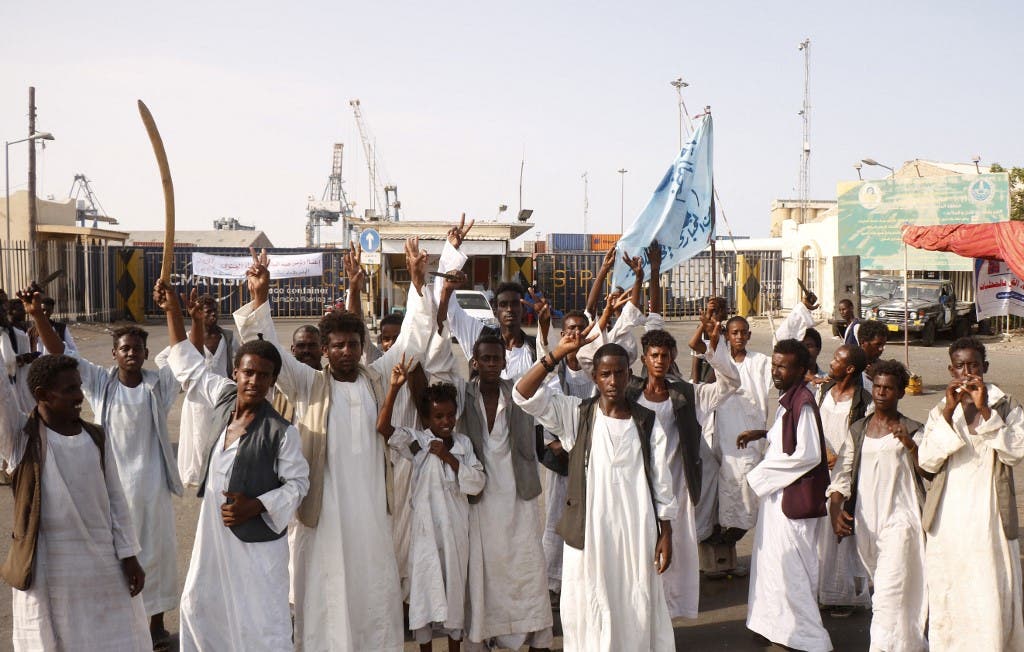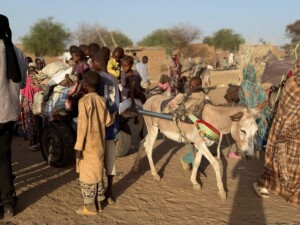Beja protesters close port in protest of Sudan’s new Framework Agreement, port workers disagree
Beja protesters have closed the gate to the Southern Port in Red Sea state since Wednesday evening in protest against the Framework Agreement, signed on Monday. Port workers are doing their best to continue work inside the port as usual.
 Protesters in the Southern Port (El Intibaha News)
Protesters in the Southern Port (El Intibaha News)
Beja protesters have closed the gate to the Southern Port in Red Sea state since Wednesday evening in protest against the Framework Agreement, signed on Monday. Port workers are doing their best to continue work inside the port as usual.
The Red Sea state Sea Ports Authority announced that work is proceeding normally in the Southern Port, but workers told Radio Dabanga that there are dozens of Beja protesters blocking the gate to the port, preventing lorries from entering.
The seaport workers’ trade union leader Osman Tahir told Radio Dabanga that work inside the port is indeed proceeding as usual and the gate closure has not (yet) affected work.
The port workers, and other people in Port Sudan who depend on the Southern Port, reject the protest action, Tahir explained. He also pointed to the negative impact of the previous closure on the stakeholders.
Tahir accused Mohamed Tahir Eila, Governor of Red Sea state between 2005 and 2015, of inciting Sheiba Dirar, head of the National Beja Congress and the Eastern Sudan Movements Alliance, to close the port and called on them not to use the work at the harbour as leverage in political conflicts.
Dirar confirmed to Radio Dabanga that they have closed the Southern Port since Wednesday evening to protest against the Framework Agreement, but that they also call for more employment and other development-related demands.
On Wednesday, he threatened to block access to the Northern Port and the Suakin Port as well. Some news media reported today that 'Dirar's protesters' have temporarily withdrawn from blocking the port.
Dirar said that the closure of the port does not affect the entire city's population, but limited groups. Workers are allowed to enter, lorries are not, until their demands are taken seriously.
Eisa Dabloub, Director of Operations at the Southern Port, said he intends to meet with Dirar as the closure of the Southern Port gate “causes harm to all people” even though Acting Director of the Southern Port Abdelmutalib Osman said that the closure of the gate does not affect the work of the port.
He also pointed to the impact of the previous closure on the economy and the reputation of the Maritime Ports Authority and explained that the port has only just begun to recover.
The port workers themselves said in a press statement on Wednesday that “the cause of eastern Sudan is a just cause, as the east has suffered injustice and marginalisation by all governments since the independence of Sudan.
“The eastern Sudan cause, however, should be dealt with seriously and not be abused in order to settle political disputes [..] supposedly in the name of eastern Sudan.”
“The closing of the port to put pressure on governments is a weapon that affects the port workers before anyone else as they are the weakest segment. Their income depends on their sweat and daily work as they do not have monthly salaries like those working for state or private companies,” the workers said. If they cannot work, they will not get paid.
Framework Agreement
The Framework Agreement is the newest agreement between a civilian alliance, dominated by the mainstream Forces for Freedom and Change-Central Council (FFC-CC), and the military junta.
Five important contentious issues for the agreement between the military junta and the civilian components still have to be discussed further as there are differing opinions within the Forces for Freedom and Change coalition. The outcomes will be laid down in a ‘final agreement’ which is expected to be reached at the end of this December.
Governance in Eastern Sudan is one of the thorny issues. Others are concerned with justice and transitional justice, security and military reform, approaches to empowerment* removal, and possible amendments to the Juba Peace Agreement.
The Eastern Sudan Groups Coordination Committee described the framework agreement as “a suspicious, imported settlement based on a secular constitution” in a press statement on Tuesday.
Escalatory steps
Nazir Sayed Tirik, co-deputy head of the Forces for Freedom and Change-Democratic Block (FFC-DB) and chair of the High Council of Beja Nazirs and Independent Chieftains, said that eastern Sudan rejected the framework agreement and may take “escalatory steps” on Wednesday.
The FFC-DB, dominated by rebel movements and eastern Sudan opposition parties and groups, announced earlier that they will join “the demonstrators in the street” and “to bring the framework agreement down within three months.”
In a press conference in Khartoum, he repeated his stance that the issue of eastern Sudan “cannot be solved by others” and called on “the Commander-in-Chief of the Sudan Armed Forces and the mediators to sit with them in a separate platform to reach an agreement to be included in the various documents”.











 and then
and then